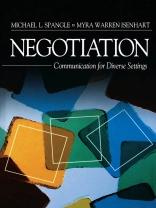Negotiation is not formulaic. How we negotiate is determined largely by the context in which the negotiation process takes place. Negotiation: Communication for Diverse Settings provides the reader with a comprehensive overview of the negotiation process as it applies to a wide variety of contexts. Skillfully weaving practitioner interviews and real world examples throughout the book, Michael Spangle and Myra Warren Isenhart emphasize the day-to-day relevance of negotiation skill. The authors provide knowledge vital to successful negotiation in a variety of situations, including interpersonal relations, the workplace, shopping and other consumer settings, community relations, and international affairs. Discussions of the moral and ethical dilemmas of negotiation-as well as the detail provided in various sections, such as international negotiations will undoubtedly prove useful to novice and seasoned negotiators alike.
Features of this text
- Takes a communication perspective, analyzing the negotiation process and how different settings and elements affect negotiation strategies and techniques;
- Discusses the cultural context of conflict in U.S. society throughout;
- Introduces basic theoretical principles and practical steps in the negotiating process;
- Moves on a continuum from micro (interpersonal) to macro (international) levels of negotiation;
- Addresses the interpersonal skills necessary for effective negotiation, factors that cause negotiations to break down, and what to do when that happens;
- Includes ‘Professional Profiles’ interviews with professional negotiators from a variety of backgrounds;
- Brings concepts to life for students through the use of boxed negotiation examples from a variety of contexts.
Recommended for upper-level undergraduate and graduate students taking courses in conflict management and negotiation. Also useful for students in applied programs, such as training and adult education courses in management development, conflict management, and negotiation.
Tabla de materias
Introduction
Preface
1. Foundations of Negotiation
Communication and negotiation
Economic and social-psychological dimensions of negotiation
The content of negotiation
Distributive and integrative approaches
Cooperative or Competitive
The importance of understanding context
Summary
2. Contextual Nature of Negotiation
Structure
Norms and Values
Relationship
Communication
Interdependence
Power
Summary
3. Theoretical Perspectives
Identity theory
Social interaction theory
Field theory
Human need theory
Rational choice and game theory
Transformation theory
Mutual gains theory
Summary
Professional Profile – William Ury
Professional Profile – James Freund
4. Negotiation Processes
Prenegotiation
Opening
Information sharing
Problem solving
Agreement
Summary
Professional Profile – Lawrence Susskind
Professional Profile – Marvin Johnson
Professional Profile – Edward Selig
5. Qualities and Skills of Negotiators
Qualities of the mind: Preparation and good questioning
Qualities of the heart: Listening, managing emotion, integrity
Qualities of courage: Speaking clearly, relationship building, creativitiy
Communication competence
Does personality style make a difference in negotiations?
Does gender influence effectiveness in negotiation?
Summary
Professional Profile – Linda Putnam
Professional Profile – Robert Waterman
6. When Negotiation Breaks Down
Barriers that create impasse
Overcoming barriers
When people are the problem
Mediation
Arbitration
Ethics
Summary
Professional Profile – Elaine Freeman
Professional Profile – Robert Coulson
Professional Profile – Anthony Roisman
7. Interpersonal Negotiation
Antecedents
Structure
Norms and values
Relationship
Communication
Interdependence
Power
Summary
Professional Profile – Marjorie Bribitzer
Professional Profile – Christie Coates
Professional Profile – Sam Keltner
8. Consumer Negotiation
The impact of choice
Lack of loyalty
Perception of entitlement
Consumer groups
Consumer relations
Seller tactics
Buyer tactics
E-negotiation
Consumer problems
Identity fraud
Contracts
Summary
Professional Profile – Barbara Opotowky
Professional Profile – Christine Beard
Professional Profile – Russel Tourbeville
9. Organizational Negotiation
Structure
Norms and Values
Relationship
Communication
Interdependence
Power
Salary negotiations
Professional Profile – Joseph Rice
Professional Profile – Annie Hill
Professional Profile – Karen Graves
Professional Profile – Judy Towers Reemstma
10. Community Negotiation
Structure
Norms and Values
Relationship
Communication
Interdependence
Power
Community negotiation processes
Summary
Professional Profile – John Fiske
Professional Profile – Wayne Carle
Professional Profile – Charles Currie
11. International Negotiation
Structure
Norms and Values
Relationship
Communication
Interdependence
Power
Summary
Professional Profile – Peter Adler
Professional Profile – Edward King
12. Integrating the Art with the Science of Negotiation
Contextual differences
Skills and processes
Barriers
Professional differences
New directions
Conclusion
References
Index
About the Authors
About the Contributors
Sobre el autor
Myra Warren Isenhart teaches, writes, and consults about topics in organizational communication. Currently a faculty member at the University of Denver, she has also served on faculties at the University of Colorado at Denver and St. Thomas Theological Seminary. Her MA & Ph D are in Human Communication. She is a speaker and author on conflict management in the workplace. She has published a articles in communication journals and coauthored Collaborative Approaches to Conflict Management also published by Sage. Her clients are broad based, with concentrations in health care, software development, and government. She serves on several nonprofit boards.












